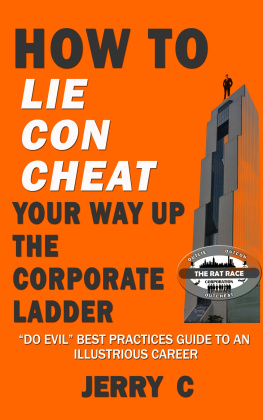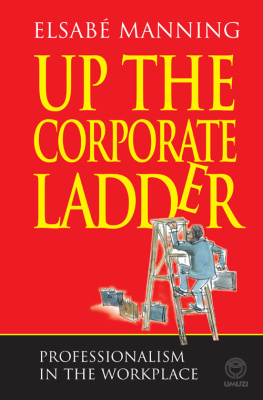Jerry C - How To Lie Con Cheat Your Way Up The Corporate Ladder
Here you can read online Jerry C - How To Lie Con Cheat Your Way Up The Corporate Ladder full text of the book (entire story) in english for free. Download pdf and epub, get meaning, cover and reviews about this ebook. genre: Romance novel. Description of the work, (preface) as well as reviews are available. Best literature library LitArk.com created for fans of good reading and offers a wide selection of genres:
Romance novel
Science fiction
Adventure
Detective
Science
History
Home and family
Prose
Art
Politics
Computer
Non-fiction
Religion
Business
Children
Humor
Choose a favorite category and find really read worthwhile books. Enjoy immersion in the world of imagination, feel the emotions of the characters or learn something new for yourself, make an fascinating discovery.
- Book:How To Lie Con Cheat Your Way Up The Corporate Ladder
- Author:
- Genre:
- Rating:5 / 5
- Favourites:Add to favourites
- Your mark:
- 100
- 1
- 2
- 3
- 4
- 5
How To Lie Con Cheat Your Way Up The Corporate Ladder: summary, description and annotation
We offer to read an annotation, description, summary or preface (depends on what the author of the book "How To Lie Con Cheat Your Way Up The Corporate Ladder" wrote himself). If you haven't found the necessary information about the book — write in the comments, we will try to find it.
Jerry C: author's other books
Who wrote How To Lie Con Cheat Your Way Up The Corporate Ladder? Find out the surname, the name of the author of the book and a list of all author's works by series.
How To Lie Con Cheat Your Way Up The Corporate Ladder — read online for free the complete book (whole text) full work
Below is the text of the book, divided by pages. System saving the place of the last page read, allows you to conveniently read the book "How To Lie Con Cheat Your Way Up The Corporate Ladder" online for free, without having to search again every time where you left off. Put a bookmark, and you can go to the page where you finished reading at any time.
Font size:
Interval:
Bookmark:
HOW TO LIE CON CHEAT YOUR WAY UP THE CORPORATE LADDER
Do evil best practices guide to an illustrious career
JERRY C
Copyright 2020 Jerry C
All rights reserved. No part of this publication may be reproduced, distributed, or transmitted in any form or by any means, including photocopying, recording, or other electronic or mechanical methods, without the prior written permission of the publisher, except in the case of brief quotations embodied in critical reviews and certain other non-commercial uses permitted by copyright law. For permission requests, write to the publisher
First Printing, 2020
Contents
i
PART I SETTING up for success
PART II WORK-EVIL BALANCE
PART III BATTLE OF MID-WAY
PART IV SURVIVING THE TOP
There is a common belief that hard work and emotional intelligence are what you need to move up the corporate ladder. Unfortunately, many have learned the hard way that this common-sense perception is far from the truth and does not apply to the corporate world.
One of the most controversial ways to move up the corporate ladder is by "doing evil ." Even though " doing evil" is rampant in most organizations, it is a taboo subject.
This book takes a light-hearted look at evil career practices . The evil strategy and tactics are shared and discussed. Additionally, the rationale on why each tactic works time and again is explained.
While most will condemn evil practices, the fundamental rationale is evil exists. The reason is survival. Every living organism's sole purpose of existence is to survive. Employees in a corporation are no different.
A company is an entity in its own right, but its presence is due to people within the organization. These are people with the need to survive. The instinct to survive is the root of all evil.
An employee's sole purpose of working is for his or her individual survival. It is never for the survival of the corporation. The ambition of employees always far exceeds the importance of the corporation.
This misalignment of aspiration creates two types of employees. Employees who prefer a symbiotic relationship with the company and employees who prefer a parasitic relationship. Employees in a symbiotic relationship with the company believe their survival is dependent on the company's survival. On the other hand, employees in a parasitic relationship be lieve in leeching on the wealth of the company. Regardless of the employees principle of survival, the employee's purpose of employment is always individual ambition rather than the organizational goal.
Organizations generally become dysfunctional when the management fails to grasp this fundamental of misaligned employee-company aspiration, and do not take active steps to align the expectations.
This book is narrated as a "do evil " guide to make it entertaining. The narration starts with getting into the corporate world, then goes on to describ e the strategy to survive and make it to the top.
The purpose of the book is not to advocate evil practices but to raise awareness of these practices. It explores the psychology behind the evildoers and gives an insight into the reason for their actions.
PART
Setting up for success
The first few steps
Before we embark on discussing evil practices, it is ideal to first appreciate the organization that will sub-consciously promote evil practices.
Lets start the discussion. Assuming you are a fresh graduate looking for the ideal organization to make your career. How will you go about it?
You have just graduated, and you are all prepared to take on the corporate world. Armed with a degree from a top university and the brain that is the envy of your peers, no one can stop you from moving to the top. At least, that is what you may be thinking. But hold on! This description does not sound right. If these are the criteria to make it big, then you or I am unlikely to fit the bill. And this book sucks because it will probably contain lots of IQ, EQ, and academic hooey that are not practical for you.
You are absolutely right! Fortunately, if you are nothing like that described person, you have nothing to worry about.
You do not need a degree from a top university or the brain of a genius to make it big in the corporate world. The reality about moving up in the corporate world has little to do with any of that. It is about field-tested practical evil tactics that have worked time and again. Don't be surprised to find the CEO of a large corporation to have used these tactics to reach the top.
This book will pull you out from the abyss of this ignorance and help you gain enlightenment on this matter.
The criteria to move up the corporate ladder have little to do with high intelligence or academic qualifications. Neither does it have to do with hard work and capability.
The reality is performance and capability may work against you for a fast track career.
The only criterion for a fast track career is about knowing the corporate career game and how to play it. How well you play these games determines how far you will climb up the corporate ladder.
So game on, let's start with lesson one, the first step.
This may sound obvious. T he first step in moving up the corporate ladder is to find the right ladder. Organization comes in all shapes and sizes. If you intend to move up, you should at least find one that is sufficiently large for you to grow your career. And this is the first rule. Size does matter!
The smaller organization has fewer opportunities for promotion. And more importantly, small organizations have fewer people to share the workload. You have to do more work for the recognition of your contribution. A common mistake in planning a career is having the ignorant belief that promotion automatically comes with hard work. The road to promotion has little to do with hard work.
It is actually the contrary. When you do work, you are expected to produce results. This expectation comes with lots of risks. What if you make a mistake? What if you failed to meet the deadline? There are many what-ifs to make you fail and few what-ifs to help you succeed. In other words, the more you do, the more likely you will fail. The more failures you have, the less likely you will get promoted and move up the ladder.
Obviously, regardless of your aspiration, somebody needs to work for the company to continue operating. For a company to exist, it needs to produce products and services for its clients. Therefore, every company needs somebody to do or make the things that the company sells. It just need not be you.
You are meant for greater things. You are going to lead! Well, this is just an excellent way to say you take a job to coordinate, and another reason you have to find a large organization.
Small organizations have few divisions. Almost everyone in the organization knows everyone else. It doesnt make sense for the organization to hire a person whose only job is to coordinate work among others.
However, it is not the same in a large organization. Large organizations are mostly dysfunctional. The left hand hardly knows what the right hand is doing. There are many people and many divisions that dont operate effectively across the organization. Moreover, most divisions are si los with no knowledge of what other divisions are doing.
The solution to this is to have people whose only job is to tell the left hand what the right hand is doing and vice versa. In a way, there are two main type s of jobs in a large organization: worker and coordinator.
A worker performs material work, and he or she does stuff that keeps the company running. We call these people as Producers because they are producing stuff for the company.
Next pageFont size:
Interval:
Bookmark:
Similar books «How To Lie Con Cheat Your Way Up The Corporate Ladder»
Look at similar books to How To Lie Con Cheat Your Way Up The Corporate Ladder. We have selected literature similar in name and meaning in the hope of providing readers with more options to find new, interesting, not yet read works.
Discussion, reviews of the book How To Lie Con Cheat Your Way Up The Corporate Ladder and just readers' own opinions. Leave your comments, write what you think about the work, its meaning or the main characters. Specify what exactly you liked and what you didn't like, and why you think so.










